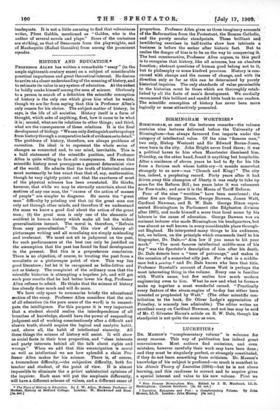HISTORY AND EDUCATION.*
PEoPEssos ALLEN has written a remarkable " essay " (in the ample eighteenth-century sense) on a subject of considerable practical importance and great theoretical interest. He desires to arrive at a closer understanding of the meaning of history, and to estimate its value in any system of education. At the outset lie boldly ranks himself among the men of science. Obviously to a person in search of a definition the scientific conception of history is the only one which gives him what he wants, though We are far from saying that this is Professor Allen's only reason for his choice. The subject-matter of history, he says, is the life of all societies. History itself is a form of thought, which asks of anything, first, how it came to be what it is second, what are its relations to other things; and third, what are the consequences of these relations. It is the final development of biology. "We can only distinguish anthropology from history through a comparative lack of evidence as to detail." The 'problems of history, therefore, are always Problems of causation. Its ideal is to represent the whole series of changes as connected and, to our mind, inevitable. This is a bald statement. of the Scientific position, and Professor Allen is quite willing to face all consequences. He sees that scientific history must presuppose a general determinist view of the world. He admits that the truth of historical science must necessarily be less eject than that of, say, mathematics, though be very rightly points out that the exactness of most of the physical sciences has been overstated. He thinks, however, that while we may be eternally uncertain about the motives of any one man, the "causes of the action of masses of people" are simpler to diagnose. He meets the "great man" difficulty by pointing out that (a) the great man can only act through other minds, and therefore if we understand the mass we know a good deal about the action of the great man ; (b), the great man is only one of the elements of accident in human history which make all but the widest generalisations inexact. The moral is, therefore, "Refrain from easy generalisation." On this view of history all picturesque writing and all moralising are simply misleading and irrelevant. We "must not it in judgment on the pest, for such performances at the best can only be justified on the assumption that.the past has found its final development
in the present. But this is a preposterous conclusion. There is no objection, of course, to treating the past from a moralistic or a picturesque point of view. This way lies good literature; but let it be recognised as belles-lettres and not as history. The complaint of the ordinary man that the scientific historian is attempting a hopeless job, and will get such poor results that he had better lower his flag, Professor Allen 'refuses to admit. He thinks that the science of history has already done much and will do more.
We have only space to summarise briefly the educational section of the essay. Professor Allen considers that the aim of all education (in the pure sense of the word) is to emanci- pate the intelligence. For this purpose it is very important that a student should realise the interdependence of all brandies of knowledge, should have the power of suspending judgment and of working conscientiously after a difficult and elusive truth, should acquire the logical and analytic habit, and, above all, the habit of intellectual sincerity. All these things the science of history will assist. It will show us Social facts in their true proportion, and "class interests and party interests behind all the talk about rights and wrongs." When we add that this emancipation is moral as well as intellectual we see how splendid a claim Pro- fessor Allen makes for his science. There is, of course, a tremendous difficulty,-the subjective difficulty, both for teacher and Student, of the point of view. It is almost impoisible to eliminate the a priori unhistorical opinions of the inquirer. Each man will put the emphasis differently, will have a different scheme of values, and a different sense of
• Th. Plats of History in Bduiation. By J. W. Allen, Hillman Professor of Modern History at Bedford College. London: W. Blackwood and Sons. Os, net.]
proportion. Professor Allen gives us three imaginary accounts of the Reformation from the Protestant, the Roman Catholic, and the purely secular standpoints. These brilliant and bewildering exercises in half-truths show how intricate a business is before the seeker after historic fact. But to realise the danger of bias is to be on the way to conquering it. The best counteractive, Professor Allen argues, to this peril is to recognise that history, like all sciences, has an absolute function; abstract questions of human good belong not to it, but to philosophy or some kindred province. History is con- cerned with change and the causes of change, and with its direction only so far as this can be determined by purely historical inquiries. The only standards of value permissible to the historian must be those which are thoroughly estab- lished by all the facts of man's development. We cordially recommend this brilliant and candid little book to our readers. The scientific conception of history has never been more logically or moue attractively presented.








































 Previous page
Previous page